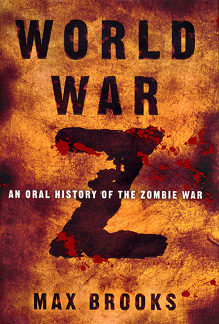Normally, I'm not a fan of zombies. That's because usually any plot with zombies is every plot with zombies. Just about every story about zombies that can be written, has been written.
 The 2013 movie is based on a 2006 book by Max Brooks,
the son of -- go figure -- Mel Brooks. (Isn't the serendipity that
moves the world just too marvelous?) I would have requested the book
from my local library,
but the only format they have it in is electronic, and since I have no
Kindle or other related hardware, I guess I'll just have to rely on the
movie to fill my zombie quota.
The 2013 movie is based on a 2006 book by Max Brooks,
the son of -- go figure -- Mel Brooks. (Isn't the serendipity that
moves the world just too marvelous?) I would have requested the book
from my local library,
but the only format they have it in is electronic, and since I have no
Kindle or other related hardware, I guess I'll just have to rely on the
movie to fill my zombie quota.So, let's talk about the movie. Actually, I don't want to. The movie is boring, so why should I waste our time talking about it? The only thing that made any difference to me was one short sentence uttered at the end of the movie by the hero, Gerry Lane. In a voice-over on top of the most lackluster reunion of a nuclear family unit I've seen, Lane says that in order to overcome the zombie plague, humans must help each other. In fact, his simple declarative statement is: "Help each other." And that is what I want to talk about here.
I might be willing to take the stance that "Help each other" is the prime ethical injunction. However, what would happen if, oh, say, the Republican Party were to adopt the motto of 'help others'? Would they lay aside their frenzied money-grubbing and buy a homeless person a meal? Would they help subsidize the heating bill of an out-of-work single parent and children? Admittedly, the platform of the Grand Ol' Party includes many planks besides lack of social responsibility: the fear of centralized power, for instance, also holds a powerful sway over Republicans. (Ironically, their first President -- Lincoln -- fought viciously to preserve federal power.) However, one of the the main points of contention with the GOP lies in its aversion to Federally-funded social-assistance programs such as Food Stamps and Welfare which, despite all the fraud, help keep people alive. By casting such measures as experiments in socialism, Republicans can decry expenditures as undemocratic, and therefore unAmerican. The wealth-pots of conservatism justify their tightfistedness by painting anyone who just happens to be out of luck and needing a helping hand, as a two-bit Commie slacker, an attitude which reminds me of the time the radical Jewish teacher Yeshua told a rich young ruler to sell everything he had and give it to the poor ... something no conservative in our time could do either, even to please God Himself.
So the question raised by this movie comes down to whether individual Republicans, without crucial networks of mutual support and benevolence, could survive a zombie apocalypse. Then again, with that said, when is it not the zombie apocalypse?

No comments:
Post a Comment